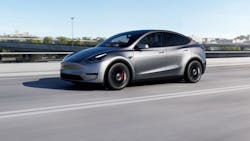Despite Record Quarterly Revenue in Q2, Tesla Warns of Slower 2024 Growth
Tesla Inc. continues its streak of rough quarters as the first half of 2024 drew to a close: Although the company posted a quarterly record of $25.5 billion in revenue, it was mostly thanks to revenue increases in its energy storage and generation business. Overall, the figure is a 2% increase year over year, but the automotive business' Q2 revenues of $19.8 billion were down 7% from a year earlier.
CFO Vaibhav Taneja, however, attributed most of the increase to “attractive financing options” that offset higher interest rates and said it was the best time to buy a Tesla.
“These programs had an impact on revenue per unit in the quarter. These impacts will persist into Q3 as we have already launched similar programs,” Taneja said. “This is the best time to buy a Tesla. I mean, if you are waiting on the sidelines, come out and get your car.”
Taneja’s comments came after a quarter in which Tesla had to digest some setbacks. Operating expenses were up nearly 40% year over year; the lion’s share of that jump was from restructuring charges associated with the layoffs Tesla conducted earlier this year. Deliveries, while higher than in Q1, were still lagging 2023 by 5% and the average sales price of Tesla’s vehicles were down, largely due to those more aggressive financing options.
Going forward, executives expect vehicle volume growth to slow for the rest year, to the point where its energy storage and generation business will outpace automotive, saying that Tesla was “between two major growth waves.”
“The first [wave] began with the global expansion of the Model 3/Y platform and we believe the next one will be initiated by advances in autonomy and introduction of new products, including those built on our next generation vehicle platform,” the company said in a presentation accompanying its second-quarter earnings. “In 2024, our vehicle volume growth rate may be notably lower than the growth rate achieved in 2023, as our teams work on the launch of the next generation vehicle and other products. “
On the topic of its next line-up of vehicles, CEO Elon Musk kept mostly quiet on a conference call aside from assuring that his team planned to launch “a more affordable model” in the first half of 2025.
Tesla also has big plans for autonomy in the coming years, which Musk widely elaborated on, calling it the “biggest differentiator” for Tesla. The company was originally set to unveil its self-driving Robotaxi on Aug. 8, but pushed the date to Oct. 10 due to what Musk said were “important changes [he thought] would improve the vehicle.”
Other Tesla plans in the autonomous space include limited production of Optimus, an autonomous humanoid robot, exclusively for Tesla’s use. Optimus has begun working in factories as the company works to “iron out” any issues. By the end of 2025, executives expect to have “several thousand” robots at work in Tesla plants before ramping up production in 2026 for a Version 2 that will be open to outside customers.
Musk also fielded questions on his team’s conference call on recent comments by former President Donald Trump that he would “end the electric vehicle mandate on day one,” if re-elected, seemingly referring to recent emissions rules set by the Environmental Protection Agency and Department of Transportation. Trump is also expected to go after EV tax credits under the Inflation Reduction Act. Musk, who has thrown his weight behind Trump, said there would be “some impact” on Tesla if he were to go through with the plans.
“I guess that there would be like some impact, but I think it would be devastating for our competitors,” he said. “But long-term, probably actually helps Tesla would be my guess.”
Taneja also commented, saying that regardless of subsidies, Tesla leadership wanted the company to grow healthily.
“We always drive ourselves to say, okay, what if there is no higher benefit and how do we operate in that kind of an environment? And like Elon said, we definitely have a big advantage as compared to a competition on that front […] You cannot ignore the fundamental size of the business. And then on top of it, once you add autonomy to it […] it becomes meaningless to think about the short-term.”
Tesla (Ticker: TSLA) reported its earnings after the bell on July 23, closing at $251.51 per share and opening at $253.45 the next day. Over the past six months, the price has fluctuated, with a recent sharp increase at the end of June through July. As of writing, the price sits at $221.71 per share, putting its market capitalization at $785 billion.
